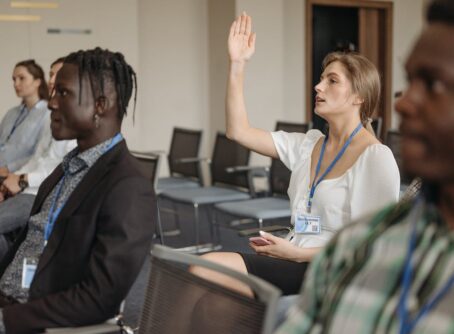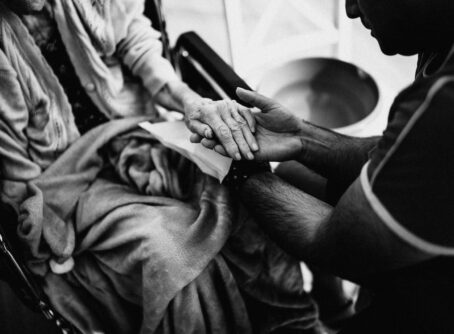
Welcome to the Academics Corner! CPJ’s ongoing series sharing the good work that Christian academics are doing to promote public justice from their research to the lecture hall.
RO: Could you tell us a little bit about your background and how you came to love Augustine’s works?
FdV: My history with Augustine goes all the way back to my childhood in Belo Horizonte, where I attended Colegio Santo Agostinho (School of St. Augustine). That’s where I was until I was seven, and so I knew the name St. Augustine from my early childhood. But it wasn’t until I became a Christian in high school and until I had my philosophy degree and master’s degrees that I actually read Augustine. I took a class on him and I was reading the Confessions for, it must have been my 37th time, and I realized that he is somebody who really understands the human heart, and who is willing to talk about the really difficult complexities of being human. He was willing to do so in a way that was honest and fairly raw, but also in a recognizably theological way.
In the Confessions, you see him struggling with his own infidelity, for instance, and with the shame that he is wrestling with. In other works, he talks about sexual abuse, and he doesn’t stop talking about the poor. So you see here somebody who’s remarkably willing to look really closely, with a lot of devoted attention, to people who really need help, and people whose lives are very difficult. He does this in a way that doesn’t ignore that the hope of the Gospel is precisely where we’re going to find tools to provide care for people in those positions.
RO: What do you think are some key aspects of Augustine’s theology that still make him incredibly relevant to young adults and well-known to this day?
FdV: I’ll focus on the one that I pick out in my book, which is how he approaches our understanding of what it means to be human, and what it means to have an identity. He talks about what it means to be you in a metaphysical and moral sense. To answer that question of “Who am I?” I have to take into account the things that I love, because who I am, for Augustine, is this aggregate of the objects of my love. People who read him often refer to his view of humanity as seeing human beings as bundles of loves. Here we have to be really careful about what love means and how love works, and Augustine does that. For him, love begins and ends with God, because love is an attribute of God, but it is also the person of the Holy Spirit. Love is also indwelt in our hearts by the Holy Spirit. He often cites Romans 5:5 on this point. But love is not just this grand theological thing, but it’s also this ordinary thing that shapes what I want to be, and what career to pursue, whom to marry, or what sports teams I like. All of these things are objects of our loves, and they shape our stories.
RO: So how would you define gender? And why are conversations around gender, which is obviously such a personal topic, important to creating communities where the operating norm is public justice?
FdV: Well, what I’m not doing is defending Augustine’s view of gender. I actually think Augustine has a problematic view of gender. Now, I think it’s problematic for reasons that people often get wrong. Nevertheless, I think he has a terrific view of human love, So I’m trying to retrieve Augustine’s theology of love, not necessarily this theology of gender. How would I define gender? Gender is the appropriation of cultural goods pertaining to the sexed body, by means of which the sexed body is socially manifested into something like an identity.
Christians have this impression that we have to create gender from the ground up, that we have to come up with these abstract and context-free norms and principles. Then we plug it in to different times and places. I don’t think our job is to come up with gender from the ground up and to define gender in a timeless way. I think we already encounter gender every time we step out of our doors. When we go to the mall, we go to men’s clothing stores or women’s clothing stores.
My point is, we don’t really have to come up with gender from the ground up, we encounter it as it hits us in the face. Anytime we step out of our front door, or anytime we go to Target, or open up Instagram. So our job is to take good stock of the gendered goods that we encounter in our day to day lives, and offer Christian wisdom for how to morally evaluate these goods in a way that’s consistent with the gospel of Jesus. There will be things that promote human flourishing, and other gendered goods will be unjust. Think, for example, of how just over 100 years ago in the United States, only white men could vote. Until 1920, voting in the United States was a gendered good. But that was an unjust good because it was a good that should not have been gendered. Denying women voting rights is an unjust gendered good that we had to work against, and we can ask ourselves that very same question today.
RO: So when you say, “justly encountering,” could that also be translated to the concept of “well ordered” that Augustine talks about all the time?
FdV: I love Nick Wolsteroff’s articulation of justice, particularly in his book, Justice: Rights and Wrongs, where he says that enjoying a just state of affairs is when you are treated in a way that’s commensurate with your worth. You might say that somebody without adequate food to eat is not enjoying the goods that are commensurate with their worth. It’s unjust that they’re living in conditions where they don’t have enough food, because they’re the kind of being who’s worth demands that they are adequately fed. I tend to think that worth and justice go together pretty neatly.
So when Augustine starts talking about justice and about ordering our loves, there’s a sense in which injustice is an expression of disordered loving. Because what we do and love in disordered ways is that we take things that ought to be received with gratitude and joy to God and turn them into objects for our own selfish consumption. For instance, in the book I talk about sexual assault because I think that’s one paradigmatic instance of gendered sin. Did the aggressor just flip in his affections? Or was his love a disfigured and sinful form of love that expresses itself most aptly as a form of hatred? Disordered loves take things that ought to be treated with worth and dignity and respect and it reduces their worth to an object of consumption. And that’s what that unjust, sinful, disordered love does. Augustine calls it the libido dominandi, or the lust for domination. So when we love in disordered ways we turn things that ought to be respected, cherished and honored, and we instead turn them into objects for our domination. So that’s, that’s where that disordered love and injustice bit ties up is that when we start dominating one another, we start treating others with less worth than they do. And that’s by definition, what injustice is.
RO: So how do you think that a clear, well defined concept of gender can affect the way we live our lives in the public sphere?
FdV: If gender is an organizing identity, and it takes various social goods that we encounter, in the public and private sphere and brings them together in a coherent way to form something like our identity. For example I’m a professor, and there are all kinds of goods that I encounter in the capacity of my identity as a professor. I have my books, I have my laptop, I have my students, I have these classrooms, I have my university building. All of these things are individual entities that are collected under the umbrella of my identity as a professor. They make sense in my life because I’m a professor. What identities do is that they take the various social goods that we encounter in our public lives, and they make a coherent sense of them. We can also talk about my identity as a father, as a husband, or as a fan of Liverpool Football Club. Gender works the same way. Gender is another one of our identities that makes organizational sense of the various social goods that we encounter. The food that I eat is another example. If I were to ask you, what’s a particular masculine type of food? You know what you would say? Maybe steak, right?
As Christians, we have the additional responsibility of saying, ‘Well, is this how my life ought to be lived? Are these the right kinds of goods that I need to be organizing my life around? Is this a just expression of my masculinity or my femininity? Is this unjust? Or is it maybe just neutral?’ Gender is this identity that organizes various social goods in our public lives, that we then have to make moral sense of as Christians.
RO: As you know, there are many views in our society on the definition of gender and many individuals are seeking to have an informed perspective on gender. Given that we live in a pluralistic society, how can Christians have a healthy and productive discussion about gender with those who do not share the same views or vision of human flourishing, while maintaining our own beliefs and respecting the beliefs of others?
FdV: What’s really interesting is that, if we’re talking about how to have a good conversation, I’ve seen good examples and bad examples that look almost identical in both conservative and liberal spaces. It turns out that being kind or being a jerk is the same thing wherever you go.
So often, we think that the Christ-like thing is to kind of bring in the all or nothing strike against the bad view, whereas I think there’s something to be said about allowing the person that you disagree with to actually contribute to and enrich your own thinking. Sometimes the people that I’ve disagreed with the most in my life are the people who have taught me how to ask a question in a new way, or who have introduced me to a new set of conversation partners I hadn’t heard of before, or raised for me a certain set of issues that were heightened in importance because I read this person that I disagreed with more.
I also tell my students that when they read or encounter somebody they disagree with, they should pray for their well-being, because it turns out, it’s a lot harder to be rude to somebody if you’re praying for them. So if you’re reading somebody that you really disagree with, take a moment to pray for them. It might turn out that you’re going to have a better conversation with them or about them, when you have had those kinds of practices already built up in your system. I also think that whenever you’re talking to somebody or reading a book that you find yourself heavily disagreeing with, try to find those moments of agreement; it’s not a question of whether somebody is completely right or completely wrong. It’s actually rare that you will come across a book that’s entirely false. I think these kinds of conversations go really badly when people get dismissive.
RO: In your article, Friendship with the Body and Gender Dysphoria, you frame the concept of gender dysphoria as a disconnect between an individual and their own body. Could you please provide a little more clarity and insight into what this means? Could you also discuss how this can be used by church leaders, for example, when thinking about such a topic?
FdV: I got this idea from Augustine too. In one of his sermons on Romans seven, talking about Paul’s phrase, “Who will deliver me from this body of death?” Why does Paul say that? That notion that the body is something that we need to be delivered from seems to be a pretty un-Christian thing, since we believe in the incarnation. Augustine says that it’s not a problem with the body but with death. For him, death is not just the cessation of bodily life. The concept includes that, but it’s really all the ways that God’s creation has gone wrong. He says that when death, the last enemy, is removed, then my body shall be forever my friend. He’s using this metaphor of friendship to describe what death and sin does to our relationship with our bodies.
I do think that everybody who lives under the conditions of sin experiences a lack of friendship with their bodies in some way. For example, we can talk about how there are problematic standards of beauty out there in the world, or we can talk about how basic marketing strategies are intended to show us how we’re not good enough, and how we need to buy the things so that we become good enough. So there’s all kinds of ways that the world and the culture make our friendship with our bodies something rather difficult. We’re called to love our neighbors as ourselves, and sometimes our closest neighbor is looking right back at us in the mirror — or maybe our closest enemy. We are called to love our enemies and sometimes our closest enemy looking back at us in the mirror. So there’s this fundamental breakdown with the friendship that we have with our bodies.
In the literature that I’ve consulted, there’s this tendency to prioritize the body over the mind, or the mind over the body, or psychology over the body, or the body over psychology. Many trans-affirming folks will say that it’s more about the psychological understanding. Then, in non-trans-affirming circles, you see people saying that it’s just about the body, and the mind has to go along with the body. As Christians, we should understand ourselves as complete human beings. We don’t want to separate the body and the mind, but we want these things to be together because God made them both, and thus both of those things are good. We should look for ways that we can cultivate friendship with the body, and friendship between the mind and the body.
For example, if I’m talking to someone and I said, “we’re in an argument right now, and to resolve it, I need you to give up your entire side of argument.” That’s problematic to me. Healthy friendship cultivates avenues of love in the midst of conflict instead. It looks to forge friendship right through the conflict and looks to do the hard work of loving the thing or the person before me. I think that’s a better model for understanding how this breakdown of friendship with the body works. That also means that there aren’t going to really be any instantaneous solutions, because if the conflict is serious enough, you have to work through it. Married folks kind of see this pretty readily. If you’re in a conflict with your spouse that’s sufficiently serious, you have to do the slow and hard work to restore that relationship. This analogously works the same way with our bodies, where we should strive to love our bodies and our minds in the way that God designed for them to be.
RO: How would you encourage Gen Z to engage with these topics thoughtfully? Is there something specific you would like to say to young people?
FdV: So what I tell my students is this: if gender is about our loves, and I think it is, then the kinds of pastoral questions that we need to ask must be different. If gender is about our loves, and if we want to minister well, then the kinds of questions we need to ask have to be questions orientated around the nature of someone’s love.
You can also be more specific. If you want to understand a person who’s struggling with questions about gender identity, you can ask questions about things like “What makes you feel afraid? What makes you feel safe? What makes you feel like you belong? What makes you feel like you have purpose?” Those may not intuitively be questions about gender, but they’re going to have everything to do with questions about gender identity. I sometimes see Christians who think that there’s gender desires all the way over here, and then all of our other desires are all the way over there. Then they’re separate from our questions about gender. We can’t isolate human desire like that. All of our desires are so bundled up that they are going to impact our gender desires. When folks are struggling with gender identity, it’s important to not just talk about gender. We have to consider the person as a whole, and to see who they are, where they’ve come from, and their individual story. If we don’t know their individual story, particularly their individual story understood through their loves, we’re not going to be good pastors, we’re not going to be good ministers, we’re not going to be good Christians.
Dr. Fellipe do Vale is Assistant Professor of Systematic Theology at Trinity Evangelical Divinity School, located in Chicago, and he is the author of Gender as Love: A Theological Account of Human Identity, Embodied Desire, and Our Social Worlds. He was born in Brazil and now lives with his family in the Chicago suburbs.
Rafa Oliveira is the current Program Assistant for Shared Justice. He is a recent graduate of the King’s College in New York City with a degree in Politics, Philosophy, and Economics (PPE). He is originally from Brazil, but grew up in Southern Africa, and is an ardent Manchester United supporter.





